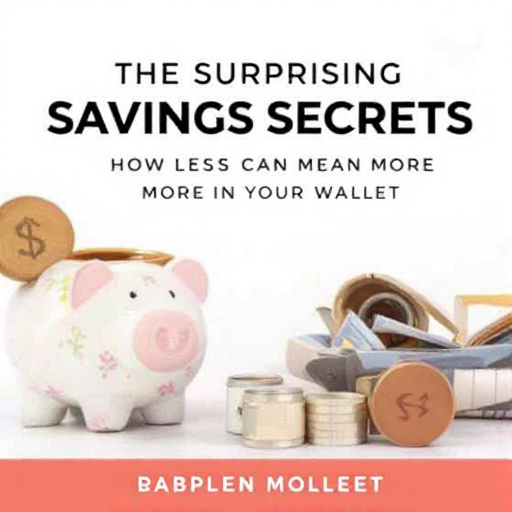Featured Articles
- Beyond Coupons and Budgets: Unveiling the Surprising Role of Sleep Patterns in Financial Well-being
- "Saving Green: How Urban Foraging Can Slash Your Grocery Bill While Reconnecting with Nature"
- Saving Space, Saving Cash: Uncovering the Financial Benefits of Minimalist Living and Decluttering Your Life
- The Surprising Savings Secrets of Minimalist Living: How Less Can Mean More in Your Wallet
- Top 8 Innovative Budget Tools Launched in the Last 5 Years: Expert Comparison & Reviews to Maximize Your Savings
Beyond Coupons and Budgets: Unveiling the Surprising Role of Sleep Patterns in Financial Well-being
Beyond Coupons and Budgets: Unveiling the Surprising Role of Sleep Patterns in Financial Well-being
Financial health is not just about budgets and coupons; surprisingly, your sleep patterns play a crucial role in your economic well-being. This article explores how the quality and quantity of sleep influence financial decisions, productivity, and overall money management.
Why Sleep and Money Are Stranger Bedfellows Than You Think
It sounds absurd at first—how could something as simple as sleep affect your bank account? Yet, a growing body of research suggests that people who consistently get less than the recommended 7-9 hours of sleep are more prone to impulsive spending and poor financial planning.
The Neuroscience Behind Sleep and Decision-Making
When you sleep poorly, the prefrontal cortex—the part of the brain responsible for self-control and complex planning—doesn't perform optimally. This impaired functioning can lead to impulsive purchases and difficulty in long-term financial strategizing. A 2011 study published in the Journal of Consumer Research found that sleep-deprived individuals were more likely to make impulsive financial decisions, such as overspending on unnecessary items.
Case Study: Sarah’s Sleepless Spending Spree
Meet Sarah, a 32-year-old graphic designer living in Portland. After switching to night shifts and logging only 4-5 hours of sleep per night, she noticed an increase in online shopping binges. “It was like I needed retail therapy just to feel better,” she admits. After tracking her spending and sleep with a fitness app, she correlated sleepless nights with large, unplanned expenses. Once she adjusted her sleep schedule, her impulse buying dramatically decreased.
The Productivity Connection: More ZZZs, More $$
Let's face it, your job performance significantly impacts your paycheck. According to the National Sleep Foundation, sleep deprivation leads to a 20-30% decrease in productivity.
Sleep-deprived workers tend to make more mistakes and spend more time on tasks, which can limit their opportunities for promotions or raises. For freelancers and entrepreneurs, this translates directly into lost income.
Statistics That Sleep on Your Wallet
Did you know that the U.S. loses approximately $411 billion annually due to sleep-related productivity loss? (Rand Corporation, 2016) That’s like throwing away an entire year's worth of GDP of some small countries because people aren’t getting enough sleep.
From Snoozes to Savings: The Consumer Perspective
Imagine you are debating between paying bills on time or binge-watching a late-night TV series. Sleep deprivation often nudges people towards immediate gratification, delaying payments and causing late fees or interest accumulation. Conversely, well-rested individuals tend to exhibit better self-discipline, reducing unnecessary costs.
Breaking the Mold: Financial Advice Should Include Sleep Hygiene
Traditional financial advice revolves around budgets, expense tracking, and savings accounts, but ignores a critical psychological and physiological variable: sleep. Incorporating sleep hygiene into financial planning could revolutionize personal money management.
Consider the simple act of establishing a bedtime routine; this might improve mental clarity and reduce emotional spending triggers. Financial advisors might want to suggest some form of sleep management as part of their consultation.
How Sleep Impacts Risk Tolerance
One fascinating aspect is how sleep affects risk preferences. Research shows that when sleep-deprived, people tend to take higher financial risks, jeopardizing their savings or retirement plans. This can be devastating for young adults just starting to invest or older adults managing retirement funds.
A Glimpse into Cultural Practices: Sleep Patterns Around the World
Anthropological studies show that cultures with segmented sleep or afternoon siestas have different economic rhythms. In Spain, for example, the siesta tradition, while declining, once contributed to a more balanced decision-making process throughout the day. Could traditional sleep practices influence communal financial behaviors and economic resilience?
Insights from the Tech World
Silicon Valley employees, often touted for their hustle, ironically suffer from chronic sleep deprivation. Startups with high burnout rates frequently face monetary instability, partly because decision fatigue caused by lack of sleep leads to costly business missteps.
Sleep Quality Beats Quantity: The Hidden Financial Impact
It’s not just how long you sleep but how well you sleep that matters. Interrupted or low-quality sleep might keep you in a heightened state of stress, increasing cortisol, which correlates with emotional and impulsive spending.
Tools to Track and Improve Your Sleep for Financial Success
Wearables like Fitbit and Oura Ring now quantify sleep stages, enabling users to correlate sleep data with spending habits or financial decision-making. Integrating these tools into daily life can illuminate hidden patterns linking rest and finances.
Age Matters: Sleep, Money, and Lifespan
At 58, I’ve noticed that my financial decisions have become more calculated, coinciding with improvements in my sleep routine. Younger readers between 16 and 30 should note that establishing good sleep patterns early could set the foundation for lifelong financial resilience.
A Friendly Nudge: Don’t Let Sleep Rob Your Wallet
Here’s the ironic twist: skimping on sleep to work extra hours may actually cost you money in the long run. The energy and focus lost during rest deprivation often offset any immediate monetary gains from longer work hours.
Start by prioritizing 7-8 hours of quality sleep per night, reduce screen time before bed, and keep consistent sleep schedules—even on weekends. Financial wealth and restful nights may be more intertwined than you’ve ever imagined.
Humorous Financial Advice from a Sleep-Deprived Mind
Imagine this—a sleep-deprived vampire avoiding the night market lest he burn a hole in his pants. While vampires don’t do budgets, humans do, and the moral is: don’t shop when you’re too tired or you might come out looking like a financial bat out of hell!
Future Research and the Road Ahead
The intersection of sleep science and economic behavior is a burgeoning field. With technology evolving, future studies might even predict personal financial risks based on sleep anomalies, offering new ways to safeguard against impulsive spending and inefficient saving.
As an anthropologist who has witnessed how cultural narratives around money and rest shape behavior, I can affirm that understanding your sleep is a path to understanding your finances.
So next time you plan your budget, add a “sleep hygiene” line to your checklist. Your wallet might just thank you in the morning.




